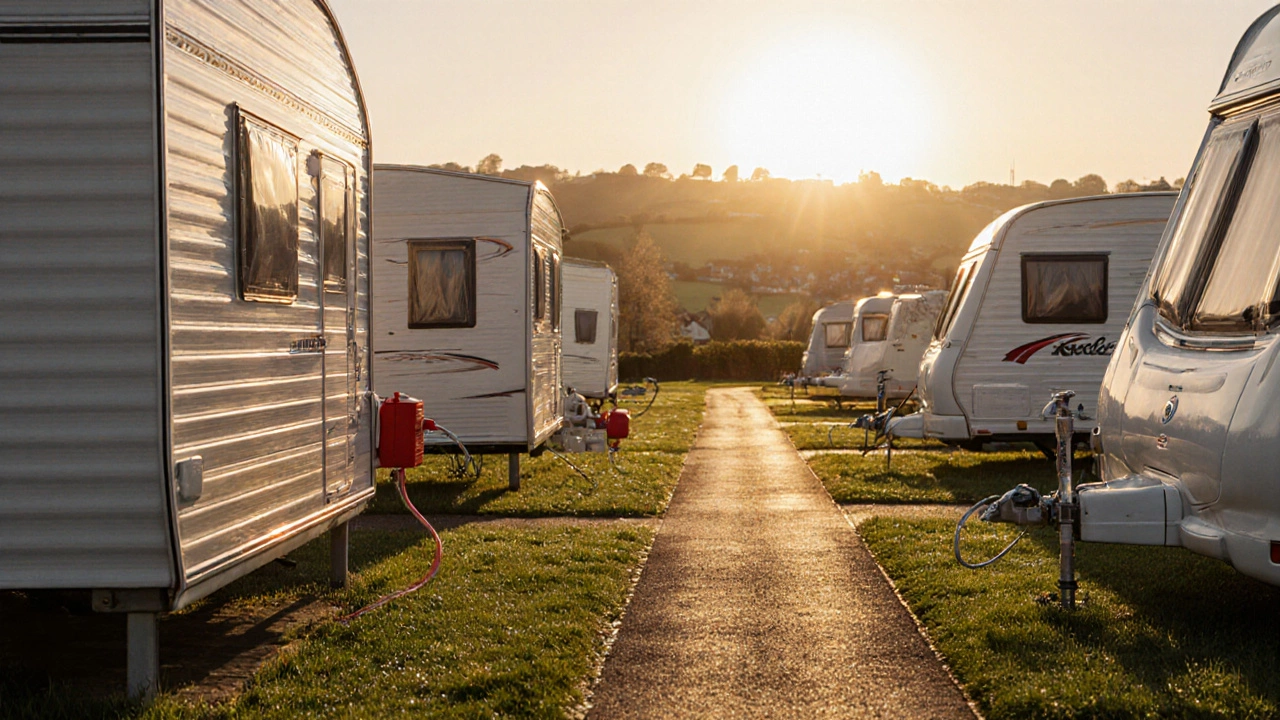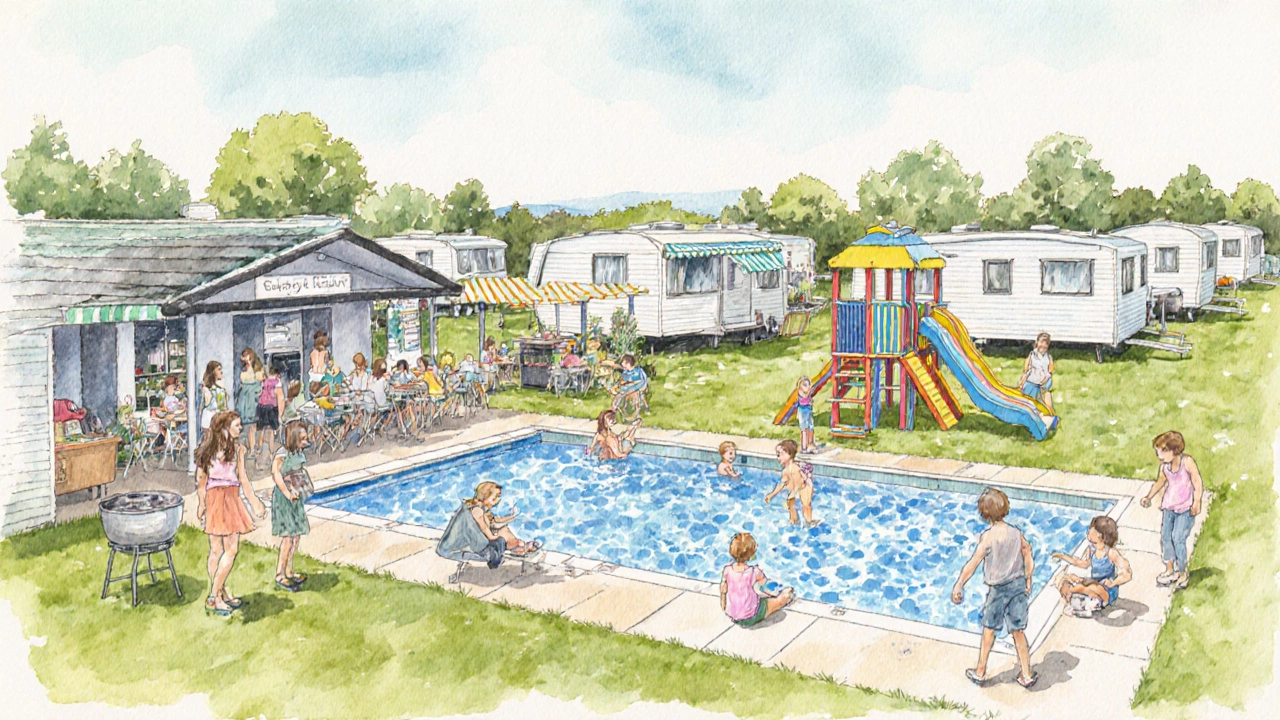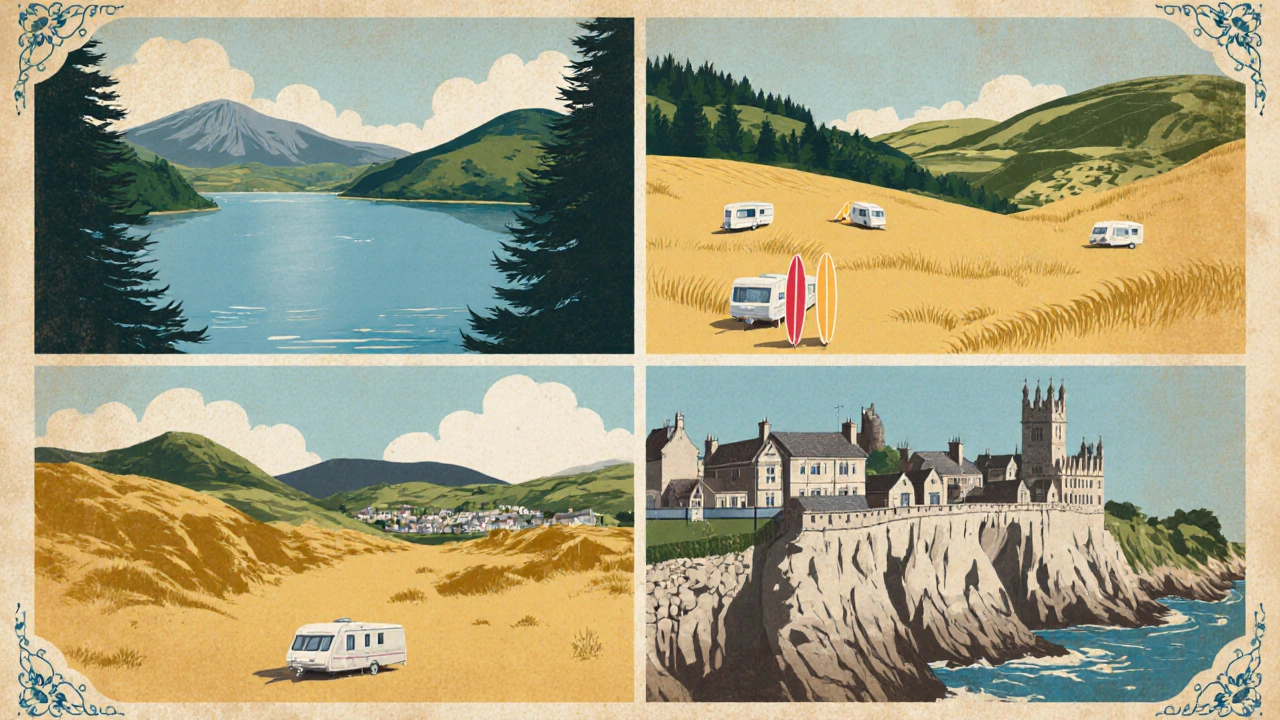Understanding English Caravan Parks: Definition, Features, and How to Choose One
 Oct, 11 2025
Oct, 11 2025
When you hear the term English caravan park is a dedicated facility in England that provides powered pitches for caravans, motorhomes and tents, along with on‑site services such as shops, laundry and recreational areas. In simple words, it’s a place where you can park your home on wheels, hook up to electricity and water, and enjoy a holiday without the hassle of finding a campsite that fits your vehicle.
What Sets an English Caravan Park Apart?
Caravan parks in England have a long history, dating back to the early 20th century when holidaymakers first started taking their caravans to the seaside. Over the decades, they have evolved into well‑regulated sites that must meet specific standards set by the Caravan and Motorhome Club and local authorities. These standards cover everything from pitch size to fire safety, ensuring a consistent experience across the country.
Core Pitch Features
Every park offers a range of pitches to match different vehicle types. A standard pitch typically measures 7×13m and includes:
- Electric hookup (usually 13A or 32A)
- Fresh water supply
- Drainage or waste disposal point
- Levelled ground and grass or hard‑standing surface
Higher‑end parks may add padded ground, extra power outlets, or even Wi‑Fi coverage across the site.
On‑Site Facility and Amenity Checklist
Most English caravan parks bundle a core set of facilities that make life on the road comfortable:
| Category | Standard Offer | Premium Add‑On |
|---|---|---|
| Sanitary | Shower block, toilet blocks | Private ensuite units |
| Food | On‑site shop, simple café | Full restaurant, gourmet deli |
| Recreation | Playground, open grass area | Swimming pool, spa, adventure course |
| Connectivity | Free Wi‑Fi in communal areas | Wi‑Fi in every pitch, TV lounge |
These amenities make a park feel more like a holiday resort than a rough camping spot. If you love cooking, look for a park with a well‑stocked shop and BBQ areas. Families often prioritize playgrounds and safe swimming pools.
Types of English Caravan Parks
Not every park serves the same crowd. Here are the main categories you’ll encounter:
- Family‑friendly parks: Equipped with kids’ clubs, safe play zones, and easy‑access pitches.
- Luxury parks: Offer glamping‑style pitches, spa facilities, and fine‑dining options.
- Rural parks: Nestled in countryside settings, ideal for walking and wildlife watching.
- Coastal parks: Situated near beaches, often with direct sand access.
Choosing the right type hinges on what you value most - whether it’s proximity to the sea, quiet rural vibes, or extra comforts.

Typical Rules and Regulations
English caravan parks operate under a set of common rules designed to keep everyone safe and happy. While each site may add its own quirks, you’ll usually find:
- Quiet hours: Typically 10pm-8am, during which you should keep music low.
- Pet policies: Most parks allow dogs on leashes; some have designated dog‑run areas.
- Fire safety: Open fires usually prohibited; use provided BBQs only.
- Waste disposal: Separate bins for recycling, general waste, and food waste; many parks provide a communal waste station.
Breaking these rules can lead to fines or eviction, so it’s worth reading the park handbook before you arrive.
Understanding Booking and Pricing
Prices vary widely depending on location, season and the level of facilities. As a rough guide:
- Mid‑week stay in a basic rural park: £20‑£30 per night.
- Weekend at a coastal luxury park: £40‑£70 per night.
- Peak summer at a popular family park: £60‑£90 per night.
Most parks offer online booking portals, but you can also call the reception directly. Early‑bird discounts are common - booking three months ahead can shave 10‑15% off the regular rate.
Popular Region Choices in England
If you’re wondering where to set up camp, these regions consistently rank highest among caravanners:
- Lake District: Stunning lakes, hill walking, and family‑friendly parks like Lakeview Caravan Site.
- Cornwall: Golden beaches, surf schools, and coastal parks such as Trevose Pines.
- Yorkshire Dales: Rolling moors, historic villages, and quiet rural sites like Hawes Caravan Park.
- South East England: Close to London, with parks near the Kent coast offering easy day trips to historic towns.
Each region has its own peak season, so plan accordingly if you want to avoid crowds.

How to Choose the Right Park - A Quick Checklist
Before you hit the ‘book now’ button, run through this short list:
- What type of Facility matters most? (e.g., pool, laundry, restaurant)
- Is the pitch size suitable for your vehicle?
- What are the pet and quiet‑hour policies?
- How far is the park from attractions you want to visit?
- Does the price fit your budget for the intended stay length?
Answering these questions will narrow down options and keep you from landing in a park that doesn’t match your expectations.
Comparing English Caravan Parks, Holiday Parks, and Traditional Campsites
Many travellers confuse these three terms. Below is a side‑by‑side look to help you spot the differences.
| Feature | English caravan park | Holiday park | Traditional campsite |
|---|---|---|---|
| Primary focus | Powered pitches for caravans & motorhomes | Static caravans & mobile homes | Tents & simple pitches |
| Typical facilities | Full Amenity suite (shop, laundry, pool) | On‑site entertainment, kids clubs | Basic toilets, maybe showers |
| Price range | £20‑£90 per night | £30‑£120 per night | £5‑£25 per night |
| Regulation level | Strict UK caravan‑park standards | Varies, often self‑regulated | Minimal, local council permits |
| Ideal for | Drivers of caravans & motorhomes seeking comfort | Families staying in static units | Backpackers, budget travellers |
Understanding these nuances helps you pick the accommodation style that matches your travel style and vehicle.
Key Takeaways
English caravan park is a purpose‑built site in England offering powered pitches, a solid set of facilities, and clear rules designed for caravan and motorhome owners. By checking pitch size, amenities, region, and price, you can find a spot that fits your holiday vibe, whether you’re after a family‑friendly beachside base or a quiet rural retreat.
Frequently Asked Questions
Do I need a caravan licence to stay in an English caravan park?
No special licence is required beyond the standard vehicle registration. However, some parks ask for proof of ownership or insurance, especially for larger motorhomes.
Can I bring my own fire pit?
Open fires are generally prohibited for safety reasons. Most parks provide communal BBQs or designated fire‑pit areas; always check the park’s fire policy first.
Are pets allowed?
Most English caravan parks welcome dogs on leashes and often have fenced dog runs. Cats are less common but allowed in some sites. Always verify pet rules during booking.
What is the typical check‑in time?
Check‑in usually starts at 2pm, with check‑out by 11am. Some parks offer early check‑in for an extra fee.
How do I dispose of waste water?
Most parks have a waste water dump point where you can empty your grey‑water tank. Follow the label instructions and avoid spilling on the ground.